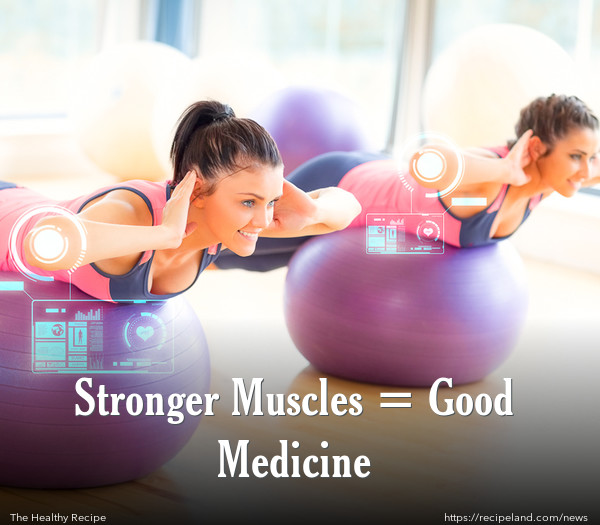New research shows that building strong muscles can improve your health in a variety of unexpected ways. Foundation Professor of Exercise and Sports Science at Western Australia’s Edith Cowan University, Rob Newton, points out a few ways that strong muscles make you a healthier person:
1. Reduce inflammation. In recent years, researchers have found that muscles are really a huge secretory organ. As they are exercised, muscles release chemicals that are similar to hormones. These chemicals, called myokines, have a huge impact on each of the body’s systems. Myokines reduce inflammation levels throughout the body, lowering your risk of developing Alzheimer’s, heart disease, and type 2 diabetes.
2. Protect your body from cancer. Myokines may also be able to stop the growth of cancerous tumors. According to Newton, “Some studies have found that extracting blood from exercising humans and adding it to cancer cells in test tubes slows the rate of cell reproduction. In a study of mice, the growth of breast cancer cells was halted in mice that exercised, while the cancer continued developing in mice that were inactive.” These findings could help to explain why exercising seems to lower your risk of developing some types of cancer and improves your chance of surviving cancer.
3. Greater ability to think and better memory. The results of a Brazilian study, published in Medicine & Science in Sports & Exercise, concluded that strength training in 60-minute intervals, three times a week over a six-month period could improve your attention span and sharpen both your short-term memory and your long-term memory. As you focus on what is required for each lift, your mind is challenged differently than it is during a repetitive exercise like rowing or jogging on a track.
4. Higher production of mitochondria. Mitochondria are the energy producers in your cells. Exercising increases the amount of mitochondria your body produces. The more mitochondria there are within your body, the more your body is able to do. Newton points out that inactivity causes the amount of mitochondria within your body to go down. As the amount of mitochondria decreases, it becomes increasingly difficult for your body to perform necessary functions. For example, it is harder to heal from an injury when there are lower amounts of mitochondria in your system.
Regular exercise is just as good for your body as a pill or treatment plan to give you more energy and strength and prevent disease. Exercising regularly throughout your life will also reduce your risk of developing diseases related to inactivity, such as cancer, Alzheimer’s, diabetes, and heart disease.
The number of inactive children is on the rise. While the amount of time children spend in front of the television, computer, or playing video games does contribute to this disturbing rise in inactivity, Newton points out that there are also many other factors to take into consideration.
Unfortunately, this inactivity does serious damage to bone strength. The best time for bone growth is throughout childhood and young adulthood. It is critical that kids get build the most bone possible during this period, up until their 30’s, to fight against the bone loss that will begin in their 40’s.
For those between the ages of 20 and 50, Newton recommends physical exercise for better overall health and performance. He encourages adults to make time to exercise, even if you have a packed schedule. Newton also points out that it is vital to do both aerobic exercise and strength training.
Adults between the ages of 50 and 65 should be physically active to prevent chronic disease. A strong body is also necessary to ensure your ability to enjoy your favourite activities as you age. Newton also reminds us that exercise is an effective way to control blood glucose levels and strength training helps your muscles repair themselves.
Seniors over the age of 60 are joining strength training classes in increasing numbers, seeking to improve their health and stop age-related decline. Newton points out that you don’t have to join a gym and lift weights. Activities such as gardening that require shovelling and carrying can build the muscle your body needs.
According to Newton, “The number one reason people go into dependent care is frailty - this is the group with the most to lose if muscle strength dwindles, but a lot to gain if they can slow muscle loss down.”
SOURCES: https://www.smh.com.au/lifestyle/diet-and-fitness/blogs/chew-on-this/why-muscles-make-good-medicine-20140404-362d5.html;https://abcnews.go.com/Health/10-ways-sharpen-brain/story?id=19002156#7; Image courtesy of stockimages / FreeDigitalPhotos.net










Comments